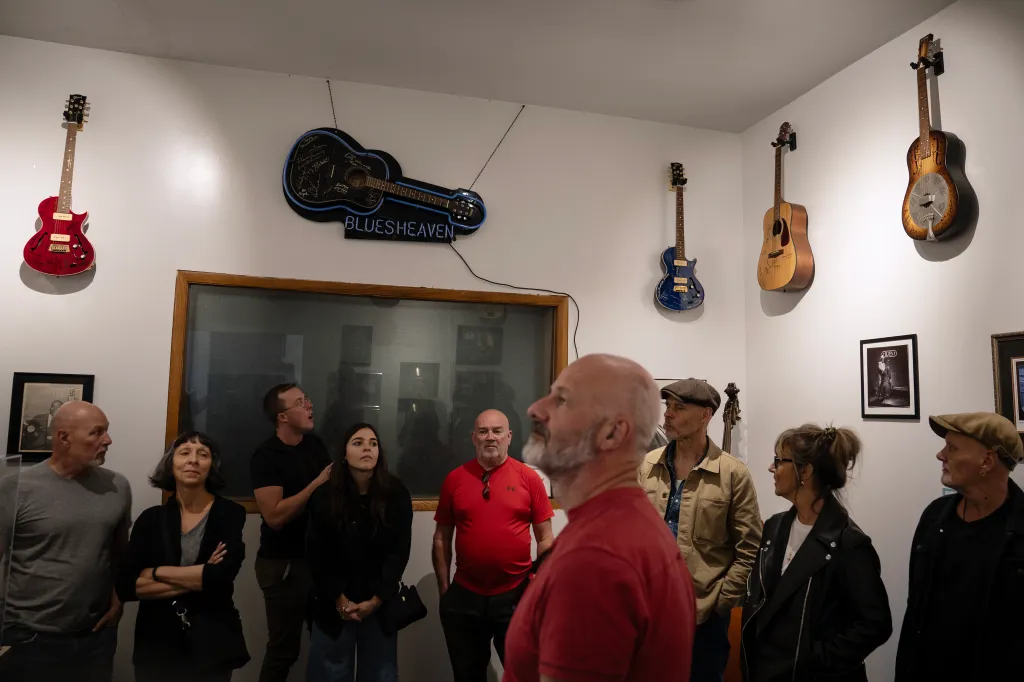
In 2010, a day after drumming before 27,000 blues fans, with pop star John Mayer’s trio at the Crossroads Guitar Festival in a Bridgeview soccer stadium, prolific session musician Steve Jordan retreated to a much smaller stage a few miles up the road. It was in a recording studio at 2120 S. Michigan Ave., where an old piano sat in the corner. One of the most famous sidemen in Chicago-blues history once played it here.
“We were playing this jam. The room started rattling. The piano started vibrating. I swear to you, I was hearing Otis Spann,” Jordan recalls. “The spirit is in that room.”
Jordan is referring to Chess Records, which Polish brothers Leonard and Phil Chess founded exactly 75 years ago. The label recorded Muddy Waters, Etta James, Howlin’ Wolf, Chuck Berry, Bo Diddley, Koko Taylor and dozens of other blues giants. The brothers bought the Michigan Avenue building in 1956, installed a studio and hired the musicians to spin out blues classics between puffs of weed in an upstairs bathroom.
“The greatest recording studio in Chicago,” says John Primer, a veteran Chicago singer and guitarist who played gigs for years with Waters and longtime Chess songwriter Willie Dixon. “A lot of good ones, but Chess was No. 1 — and still is, in the name.”
The Chess brothers founded the label at a time when African American singers were following the Great Migration, traveling from the South to northern cities that offered greater opportunities. Waters, born McKinley Morganfield, grew up on a Mississippi Delta plantation; in 1943, he journeyed to Chicago, switching from acoustic to electric guitar, transforming his country blues to a band sound that resembled a factory.
The Chess label was responsible for the following singles, and hundreds more: Jackie Brenston and his Delta Cats’ “Rocket 88,” widely considered the first rock ‘n’ roll song; Waters’ “Rollin’ Stone,” the name of which begat a British band and a defining Bob Dylan smash; Wolf’s much-covered standards “Moanin’ at Midnight,” “Little Red Rooster,” “Spoonful” and others; Berry’s “Maybellene,” the first of his immortal string of pioneering ’50s and ’60s rock hits; and Koko Taylor’s “Wang Dang Doodle,” an underrated party anthem covered regularly today at Chicago blues clubs.
“Why are we talking about these nearly 100-year-old recordings? Because in one place, under one umbrella, fantastic artists who were not afraid to bare their souls on tape found engineers not afraid to capture the spirit of their souls on recording, and they found a record company seeking fearless artistry to [build] an empire on,” says Robert Gordon, a Memphis blues historian who wrote 2002’s “Can’t Be Satisfied: The Life and Times of Muddy Waters.” “And we are the lucky recipients.”
The story of Chess begins in 1928, when Lejzor and Fiszel Czyz of Motule, Poland, fled the antisemitism of their home region with their mother and emigrated to America to reunite with their father. The brothers worked in his junkyard, but as they grew older, they pivoted to liquor, opening a store in a mostly African American part of the South Side, then a club at 3905 Cottage Grove that they called the Macomba Lounge. After the club nearly burned down in 1950, the brothers, who Americanized their names to Leonard and Phil Chess, received an insurance settlement and shifted to the record business. “Leonard Chess busts right into the disk field,” Billboard reported in July 1950.
That became Chess Records’ more or less official birthdate, around which Verve Label Group is building an anniversary album-reissue schedule, including “The Best of Muddy Waters” and Howlin’ Wolf’s “Moanin’ In the Moonlight” on Oct. 17, a Christmas album Nov. 14, Etta James’ “At Last” on Jan. 16, 2026, and compilations from harmonicists Little Walter and Sonny Boy Williamson on Feb. 20, 2026.
“The anniversary was the catalyst,” says Jamie Krents, Verve’s chief executive officer and label head. “This is not a one-and-done thing.”
At 2120 S. Michigan Ave., the 75th-birthday celebration has been somewhat more muted — an early-June concert that kicked off an annual summer series of Chicago blues stars. Today, the building’s owner and occupant is the Blues Heaven Foundation, which Dixon’s widow, Marie, created in 1997. For the Dixon family, the legacy of Chess is complicated — worthy of celebration but tinged with unpleasant history.
Like many record executives in the ’50s and ’60s, the Chess brothers took liberties with royalty payments to their artists — especially Black artists — and Waters, Dixon and Wolf sued in the ’70s, all winning out-of-court settlements. Today, Blues Heaven is in the hands of the late Dixons’ daughter, Jacqueline Dixon, president and chief executive, who is repairing and updating the studio equipment while continuing to schedule public tours of the space.
“When it comes to accounting and royalty payments, there’s a lot of discrepancies. We’re sure, without even opening the books, that things didn’t go in favor of the artists,” she says. “But their legacy is definitely in the music they created.”
Nick Moss, a veteran Elgin blues singer and guitarist who grew up listening to Waters, performs regularly as part of Blues Heaven’s summer series. He recalls changing clothes in what was once Leonard Chess’ office, with a desk containing his original index cards and scrawled phone numbers.
“This wave of emotion came over me,” says Moss. “I thought about how many wonderful musicians that I love sat across from this desk and it was like I could feel every spirit that walked across the room.”
Today, Moss records for Alligator Records, a longtime Chicago label that, in a way, inherited the Chess tradition when Bruce Iglauer founded it as a young blues fan in 1971. Iglauer belonged to a later generation of record men, focusing on albums instead of singles, and selling blues music mostly to a white audience. He credits Chess for taking a “commercial leap of faith” and allowing artists like Diddley and Berry to evolve from straight blues to the beginnings of rock ‘n’ roll.
“To develop these rock ‘n’ rollers and help them cross over — I’ve got to say that was pretty damn visionary,” he says.
After the Chess brothers sold to General Recorded Tape in the late ’60s, GRT spent the next several years running Chess into the ground, until it collapsed in the mid-’70s, unloading its master tapes to a series of labels until it landed in the hands of Universal Music.
The surviving member of the original Chess business is Marshall Chess, who sold records on the road on behalf of his father and uncle’s company almost immediately after his Chicago bar mitzvah.
“It was a rocky road,” Marshall Chess says. “I had the blues for a while there.”
Today, Chess, 83, re-experiences the business he never fully inherited through a Porsche with a custom stereo and an iPad containing what he calls a “Chess jukebox.” On Tuesdays, Wednesdays and Thursdays, he cruises around the Catskill Mountains, near his home in upstate New York, listens to Waters, Wolf and Diddley — and sometimes the Rolling Stones, with whom he used to work — and remembers the old days in Chicago, from recording sessions at 2120 S. Michigan to an orange Ford Model A truck that sold hot dogs.
“It makes me speed,” he says, on a lengthy Zoom interview. “Still.”
Steve Knopper is a freelance writer.



